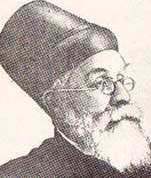| Dadabhai Naoroji (1825 - 1917) |
Dadabhai Naoroji was born to a Parsi priest's family in Bombay on September 4, 1825. He studied in Elphinstone College and became a professor of Mathematics and Natural Philosophy there at the age of 27. He was the first Indian to become a professor of the college.
When he was thirty, he left for England, where he spent most of his life writing about the condition of people in India and trying to influence public opinion for Indian self-rule. In 1886 he stood for elections to the British Parliament but lost the same.
|
 |
He was elected from Central Finsbury, London, in 1892 as a Liberal member. In 1895 he was appointed to the royal commission on Indian expenditure. He was instrumental in telling the Britishers that India was too heavily taxed, and England was taking away mass wealth from there. He returned to India on several occasions. At the request of the Gaekwad of Baroda for two years he was his chief minister, a post he resigned over difference of opinions about political reforms in the princely state. He was present at the first meeting of the Indian National Congress in 1885. He was elected president of Indian National Congress three times, during his third term, he prevented a split between moderates and extremists in the party. The Congress' demand for swaraj (independence) was first expressed publicly by him in his presidential address in 1906. Dadabhai had a special talent for mathematics, money and public finance. He propounded his Drain theory, which states: the inevitable consequence of foreign domination in the drain of wealth of the subject to the country of the rule.
The "grand old man of India", died in Bombay on June 30, 1917, believing that Swaraj was the only remedy for India's ills.
|
|
| |
| Category filed under: Political |
|
|